While Elkann arranges a capital increase, the news is that Juventus spent 34 million on agents in 2024: that’s 327 million over the last 9 years, 20% of all Italian football
Not satisfied, in January they spent 2.7 million on Kelly’s agents and 2.6 on Kolo Muani’s. From 27 million for Pogba to 11.6 for Vlahovic, 10.5 for De Ligt and 10 for Rabiot: it’s a tale of madness
(Translated into English by Grok)
You’ve all read it: just a few days ago, after Juventus sacked Thiago Motta but found themselves broke, with not a penny to cover the costs of dismissing the coach and his staff, the Exor ownership—represented by John Elkann—stepped in, injecting 15 million into the coffers as an advance on yet another capital increase, already approved, set to total 110 million. The exact amount will only be finalized in September, at the close of the transfer market. For the record: this is the fourth recapitalization, following 300 million in 2019, 400 million in 2021, and 200 million in 2024—not to mention the 175 million “Ronaldo bond” issued in February 2019, which Juventus repaid with interest by the end of February 2024.
PALLA AVVELENATA by Paolo Ziliani is a reader-supported publication. To receive new posts and support my work, consider becoming a free or paid subscriber
So, in a scenario where a billion euros have been poured into the club’s leaky coffers with no return, yesterday came the news—reported annually by the FIGC—that in 2024, Juventus was the club that paid the most to agents: 34 million (precisely 33,989,949.48), 10 million more than second-placed Inter, 15 million more than third-placed Napoli, 16 million more than fourth-placed Roma, and 19 million more than fifth-placed Milan. The FIGC has been tracking this for nine seasons, and if you’re curious, over the last nine years, from 2016 to 2024, Juventus has funneled a staggering (or shameful) 327.3 million into agents’ pockets, averaging 36.36 million per year. To put that into perspective, Juventus alone accounts for 20% of the total amount paid to agents across all of Italian football. If this were an Olympic event, with Juventus taking gold (327.3 million), Inter silver (215.5 million), and Roma bronze (182.6 million), we’d be applauding a trio that together has poured 44% of the total spent by the entire Italian football system into agents’ hands.
Adding commentary would be redundant—at least from me, who’s been writing about this for years, sadly in splendid isolation. But if you’ve got a strong stomach, I recommend reading the article I wrote about this festering sore on Italian football (with Juventus, naturally, as the starring actress) on August 6 of last year. You’ll read things you humans could never have imagined, starting with the 49 million pocketed by Mino Raiola (whom Juventus fans idolized like a top player, giving him thousand-and-one-night welcomes at Continassa) in the Pogba-Juventus-Manchester United deal, down to the millions raked in by Rabiot’s mom and the agents of Szczesny, Ramsey, and Alex Sandro for… doing nothing. If you have the time and patience to read it, you’ll understand everything.
You can find the piece I urge you not to miss here. Enjoy.
We don’t have a dime, yet we make agents rich: in 8 years, Juve spent 293 million on them (they could’ve bought Bellingham, Nico Williams, Olmo, and Koopmeiners)
When Ramsey reached his final contract year, his agents got a 3-million-euro bonus; Alex Sandro’s got 1.6 million, Szczesny’s 2.3 million. The mystery of the 13.5-million debt to Mino Raiola
According to an official FIGC report released in recent days, Serie A clubs spent 220.2 million on agent commissions in 2023, breaking the record set in 2022 when the figure was 205.7 million. A chilling detail: over the last 8 years, the presidents of our clubs have funneled 7.16% of Serie A’s total revenue—1.51 billion out of a 21.1-billion turnover—into agents’ pockets. Despite being flat broke, no one in Europe throws money away like we do: not even the filthy-rich English Premier League, which generates triple our revenue but allocates just 5.45% of its turnover to agent fees.
A disheartening reality, to say the least. Equally depressing is the news within the news—silenced as always by the Italian media—that a fifth of this mountain of money, which leaves the football ecosystem never to return, thus progressively impoverishing it, has been spent and continues to be spent by Juventus. Over the last 8 years, Madama has shelled out a stunning (or rather, revolting) 293.4 million on agent commissions alone, accounting for 19.39% of Serie A’s total spending in this area. To give you an idea of what 293.4 million means and what it could buy, consider that Real Madrid paid 103 million for Bellingham a year ago, and two young European champions like Nico Williams and Dani Olmo can be signed today by triggering their release clauses, both set at 60 million. That’s 103 + 60 + 60 = 223 million—leaving Juventus with 70 million to spare, enough to buy Koopmeiners and still have 10-15 million left over. Instead, the 293.4 million that could’ve bought Bellingham, Nico Williams, Dani Olmo, and Koopmeiners went to fatten the bank accounts of Mino Raiola, Jorge Mendes, Veronique Rabiot, and all the lucky agents Juventus has dealt with since 2016.
In my view, it’s a scandal. A scandal I’ve been writing about, unheard, for years. The tweet you see below is from the summer of 2020 and refers to the shame—or rather, the indecency—of the Pogba deal finalized four years earlier, in the summer of 2016, orchestrated by Agnelli’s Juventus, Pogba’s agent Mino Raiola (now deceased), and Manchester United.
I’d dedicated several denunciatory articles to that immoral transfer deal, published in Il Fatto Quotidiano. What happened? Juventus agreed to sell Pogba to Manchester United for a record 105 million. Of that, 27 million went straight to Raiola as a commission; then Pogba chipped in 2.6 million of his own; and Manchester United sealed the deal by wiring the agent an additional 19.4 million fee (outside the 105-million agreement). In short: Pogba’s agent pocketed 49 million from that single transfer. And if none of you have any strange thoughts about where all that money ended up, raise your hand. The best part? It all happened in broad daylight—so much so that the figures I’ve cited were faithfully recorded in the official financial statements of both Juventus and Manchester United.
For years, Juventus has carried on like this. When, in the summer of 2019, stung by their Champions League elimination at the hands of Ajax’s youngsters, Agnelli and Paratici decided to bring De Ligt—the Dutch defender who scored the decisive 2-1 goal—to Turin, the contract was signed on these terms: 75 million to Ajax plus 10.5 million in “ancillary costs” to the player’s agent. Who, coincidentally, was Mino Raiola, to whom Juventus executives kept turning (Matuidi, Kean, Wesley, Ihattaren—but it started with Ibrahimovic and even Nedved) and paying millions in commissions for every deal. What’s more, as you can read in the piece I wrote in July 2019 (linked below), Juventus did all this against FIGC guidelines, which capped agents’ fees at 3% of each transfer’s value (e.g., in De Ligt’s case, 2.25 million, not 10.5).
All above board? It’s laughable to even think so. Just off the top of my head: from the 27 million paid to Raiola for Pogba in 2016 to the 11.6 million handed to Ristic, Vlahovic’s agent, in January 2022, Juventus has practically bled itself dry with the “cuts” paid to agents. Rabiot’s mom got rich with the 10 million she pocketed in 2019 when her son signed, plus another 2 million last summer as a kind gesture for agreeing to a one-year contract extension. When Ronaldo moved from Real Madrid to Juve in 2018, his agent Jorge Mendes cashed in 12 million. But Juventus’s misdeeds in agent payouts reach dizzying heights even with bit players. Few know this, but when Ramsey—the Welsh flop brought to Turin on a golden salary—began his final season in black and white in the summer of 2022, despite never playing a game (he was offloaded to Rangers in January), his agents at Avid Sports Group received an extra 3-million-euro payout. The same goes for Szczesny’s agents at CAA Stellar, who, on July 1, received a 2.333-million “bonus” because their client reached his final contract year (even though Giuntoli decided to let him go). And believe it or not, when Alex Sandro started his seventh and final season with Juventus last summer, his agent Pablo Miranda also received a 1.65-million handout—presumably to thank him for the invaluable gift of keeping Alex Sandro (hardly a Djalma Santos) at Juve for so long.
You might say: “Okay, Juventus’s management of agents is insane, but as long as it’s all within the rules and out in the open, that’s what matters.” Well, not quite. At least according to the Turin Prosecutor’s Office, which, among the countless misdeeds attributed to the club, uncovered—not only the debt to Ronaldo (for which Juventus has already been ordered to pay the Portuguese star 10 million)—but also a debt to, guess who? Rest in peace, Mino Raiola (or rather, his successors, his brother Vincenzo and lawyer Rafaela Pimenta), for a whopping 13.5 million, the nature of which no one understands. Agnelli & Co. will have to explain this, among many other things, in the Rome trial where indictments have been requested for Agnelli, Paratici, Nedved, Arrivabene, and seven other administrative executives.
Of course, in this disgusting and garish scandal that puts all of Italian football to shame, Juventus is just the tip of the iceberg. Backing them up are two other top clubs, Inter and Roma, who aren’t exactly stingy when it comes to agent payouts: 190.8 million for Inter, 165.5 million for Roma. That means Juventus (gold), Inter (silver), and Roma (bronze) alone account for 43% of the total agent commissions paid across all of Serie A combined.
That’s all from the league with the worm—back to the studio (a medical one, if you’re feeling unwell).






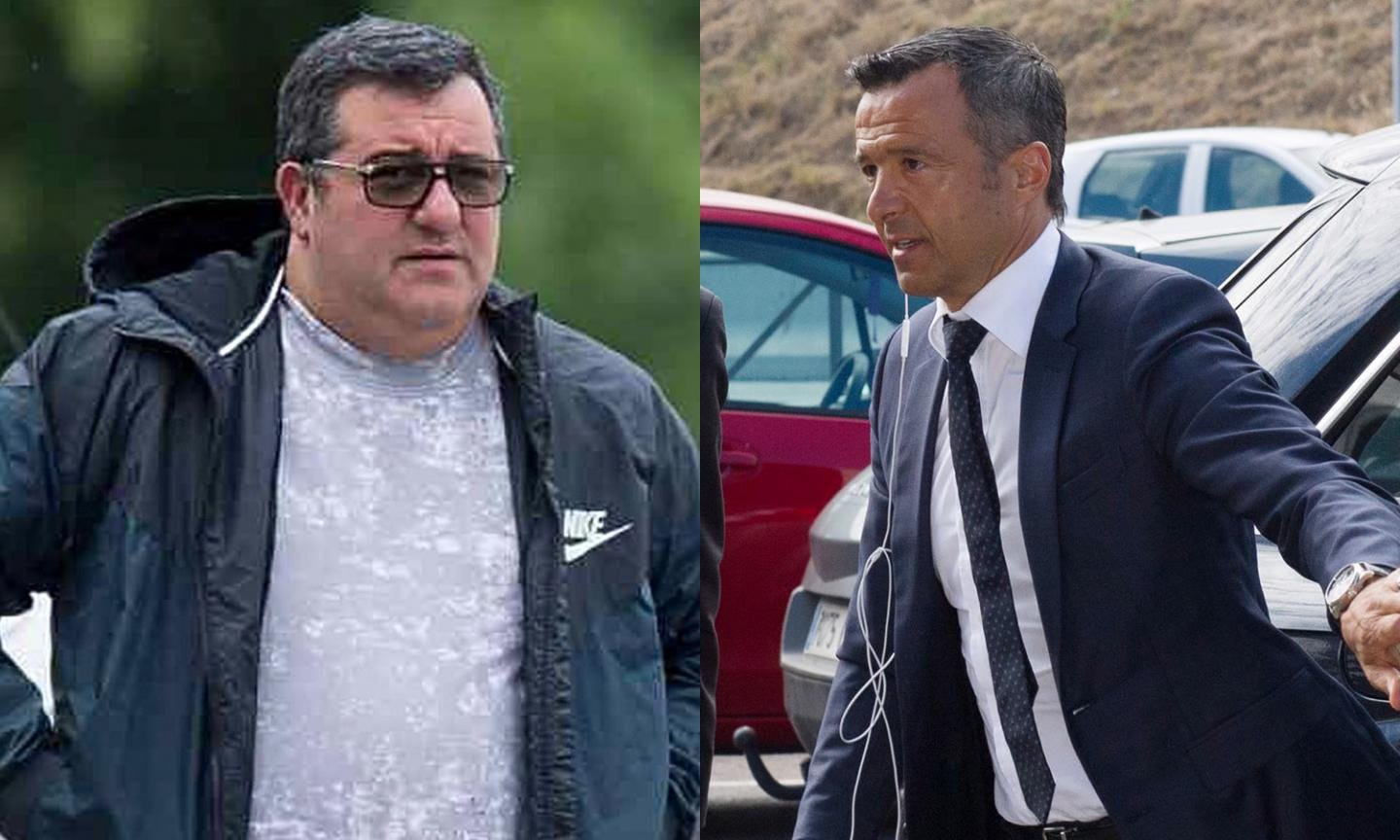
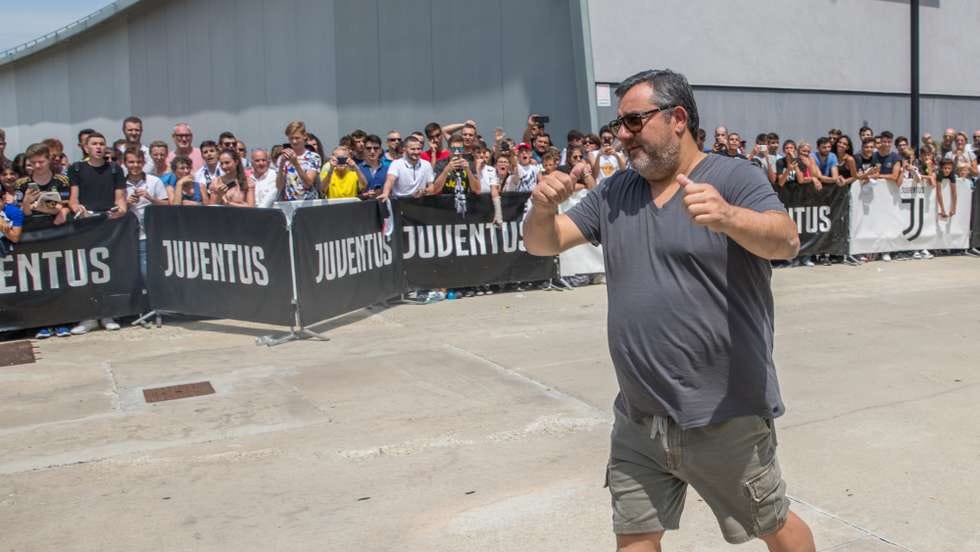
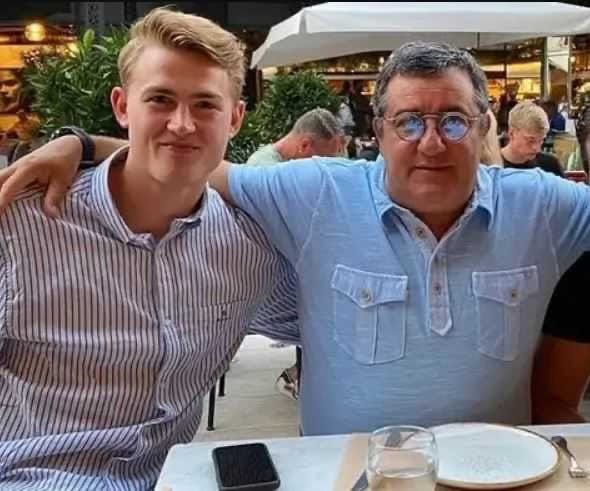

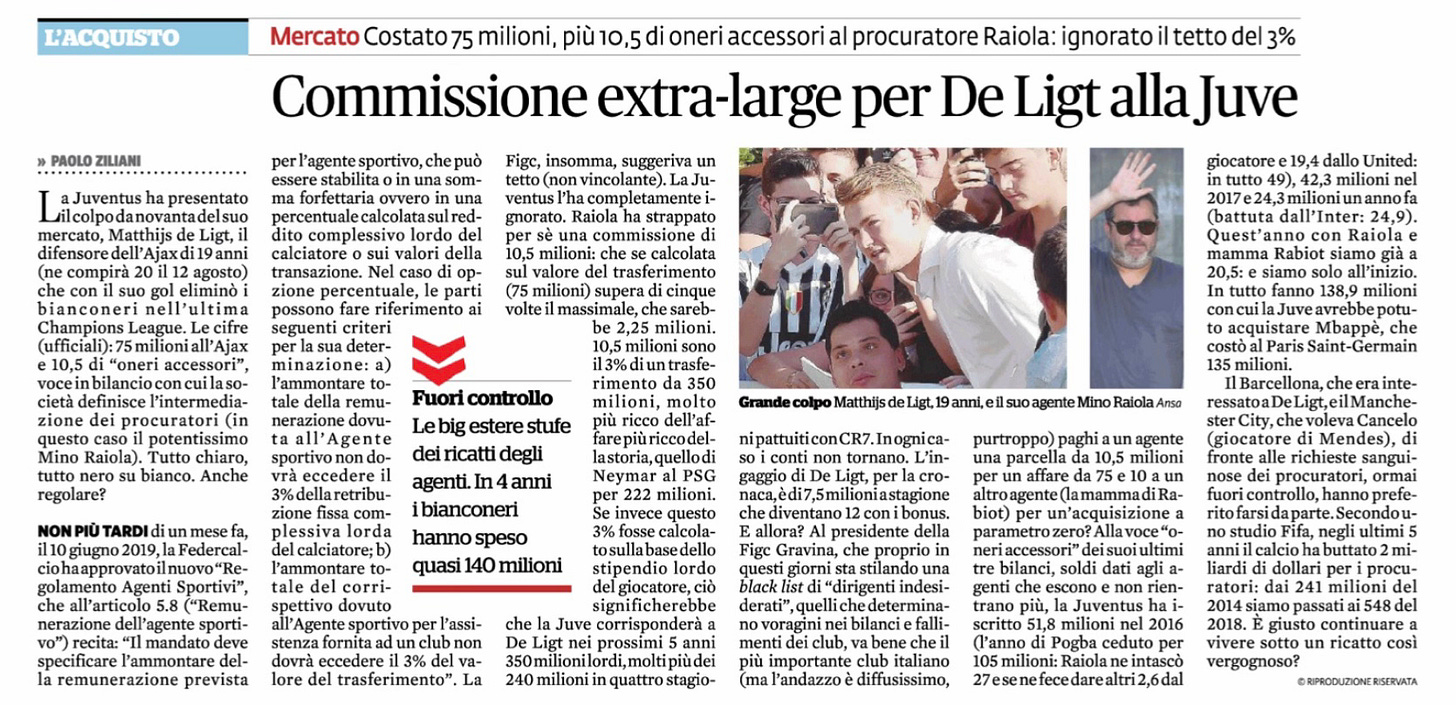
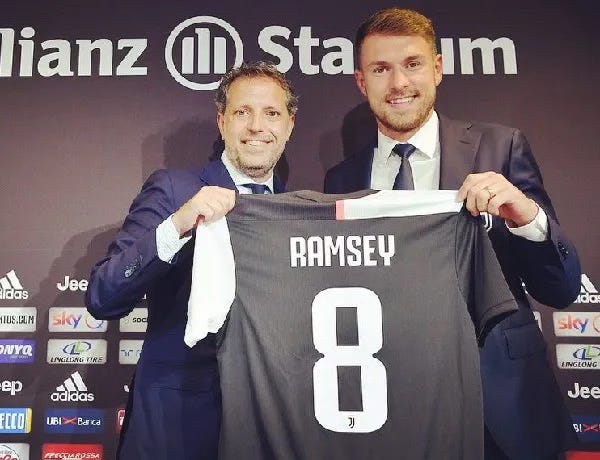

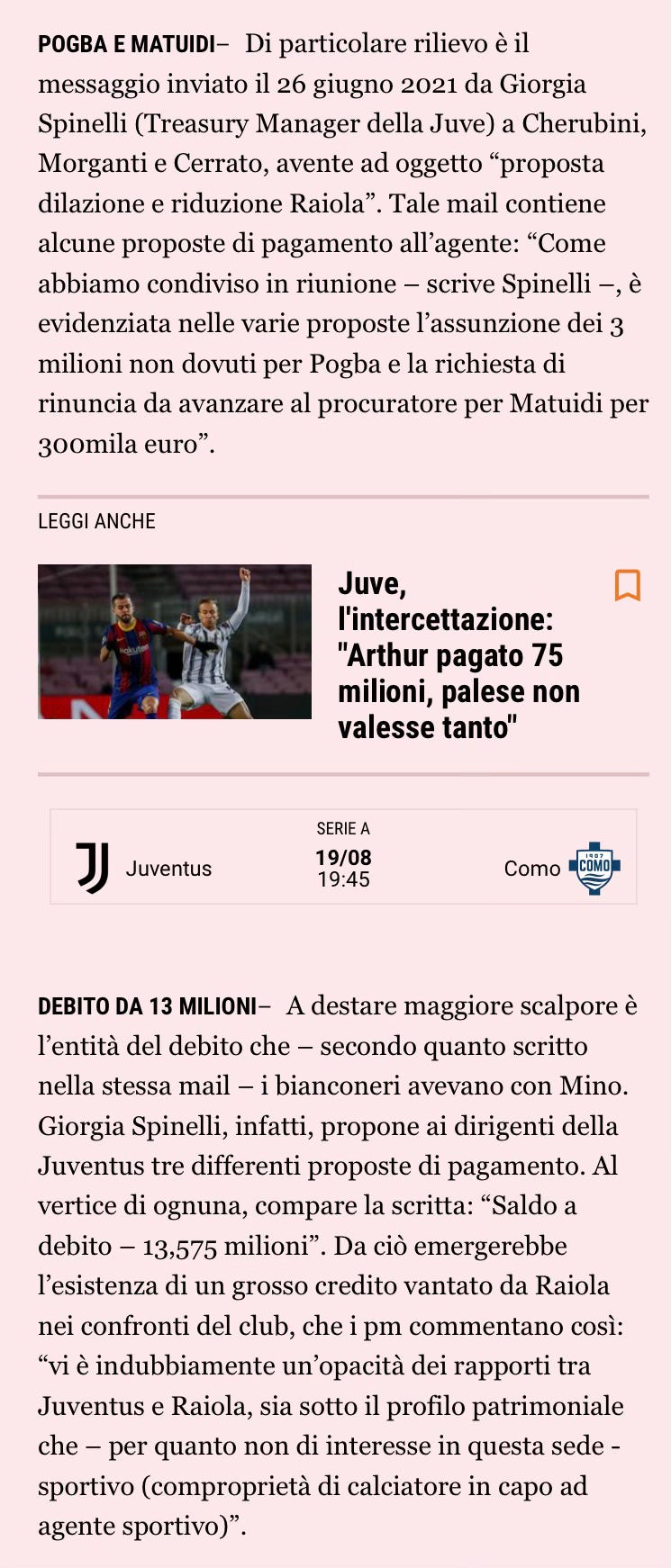
I noticed you have a very consistent amount of followers, Ziliani…
Soon you’ll realise nobody cares about what you write, except your sect of pathetic, frustrated losers.
Nice English, though: which translator are you using?